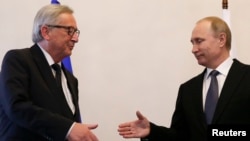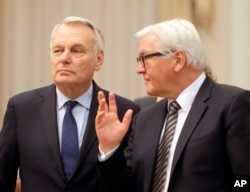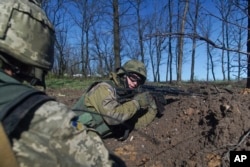European Commission President Jean-Claude Juncker’s trip to Russia this week has raised further speculation that EU sanctions against Russia, over its actions in Ukraine, are wavering just ahead of a vote on whether to extend the punitive measures.
Juncker is the highest-level EU official to visit Russia since it annexed Crimea. His participation in the annual St. Petersburg Economic Forum, along with former French President Nicolas Sarkozy and Italian Prime Minister Matteo Renzi, added weight to those calling for a return to “business as usual” in EU-Russia relations.
The EC president’s trip to the summit, which runs from Thursday through Saturday, has caused major unhappiness among EU member states and colleagues within the commission, said Fredrik Wesslau, director of the Wider Europe program at the European Council on Foreign Relations.
“The timing — days before the expected extension of sanctions — could not be worse,” he said in emailed comments to VOA. “It sends mixed and confused messages about the EU's position on Russia over Ukraine and Europe's willingness to stick to that position.”
Wavering in Europe
The EU sanctions against Russian officials, finance and defense are set to expire in July, and the 28-nation block will decide next week whether to extend them by another six months.
But, while the United States has been steadfast that sanctions should remain in place until a Minsk peace deal is implemented, cracks are beginning to show in Europe’s resolve.
The French parliament in April voted in a nonbinding resolution to lift the sanctions against Russia. Germany’s Foreign Minister Frank-Walter Steinmeier in May voiced support for a gradual easing of sanctions as progress was made on the Minsk agreement.
And as far back as October, Juncker signaled the possibility of a trans-Atlantic gap forming on sanctions when in a speech he said relations between the EU and Russia should not be dictated from Washington.
Advocating dialogue
But, while Juncker on Thursday advocated building bridges and dialogue with Russia, he put a damper on the prospect of easing sanctions during a speech at the opening of the forum.
“Russia is party to the Minsk agreements. It has made commitments and put them on paper, as have the other signatories. Therefore, the next step is clear: full implementation of the agreements. No more, no less,” Juncker said in prepared remarks. “This is the only way to begin our conversation, and the only way to lift the economic sanctions that have been imposed.”
“And let me be clear,” he added. “On Minsk, the European Union is united. And so is the G-7.”
Russia was kicked out of the G-8 group of major industrial nations shortly after it annexed Crimea.
Despite Juncker’s clear comments on sanctions, his very participation in the forum was controversial.
“The problem with the visit is that it plays into Russia's efforts to split and weaken Europe,” Wesslau said. “Russia is trying to create a narrative that relations between the EU and Russia are normalizing and that Europe is coming around to accepting the annexation of Crimea and Russia's intervention in eastern Ukraine. Juncker is now becoming part of this narrative.”
Split on Ukraine
At the forum Thursday, Juncker did not mince words in placing the blame for the deterioration in EU-Russia relations squarely on Moscow’s actions in Ukraine.
“The illegal annexation of Crimea and Sevastopol, and the conflict in and around eastern Ukraine, put the relations between the European Union and Russia to a severe test,” he said. “Russia’s actions have shaken the very principles of the European security order. Sovereignty, sovereign equality, the non-use of force and territorial integrity matter. They cannot be ignored.”
But while Juncker’s speech underscored respecting a nation’s right to choose its future, and that having a stable and democratic Ukraine on its border would only benefit Russia, political analysts have long argued that Moscow wants instability to maintain leverage against Kyiv.
“Moscow has no intention of living up to its obligations in the Minsk agreement,” Wesslau said. “Instead, it is trying to shift the blame onto Kyiv for the lack of progress.
“The problem is that when Europe sends mixed messages to Russia — for instance, with Juncker's visit — the conclusion in Moscow is that European unity in sanctions will collapse,” Wesslau said. “This makes Russia even less inclined to implement the Minsk agreement and more inclined to hold out and wait for the collapse. But this, in turn, means no progress on Minsk and makes Europe even less likely to lift the sanctions."
Also at the forum Thursday, former French President Nicolas Sarkozy, whose party members led the French vote to lift EU sanctions, gushed praise for Russian President Vladimir Putin. He urged Putin to show his strength as a leader by first lifting countersanctions against EU food imports. Russian officials quickly rejected the idea.






